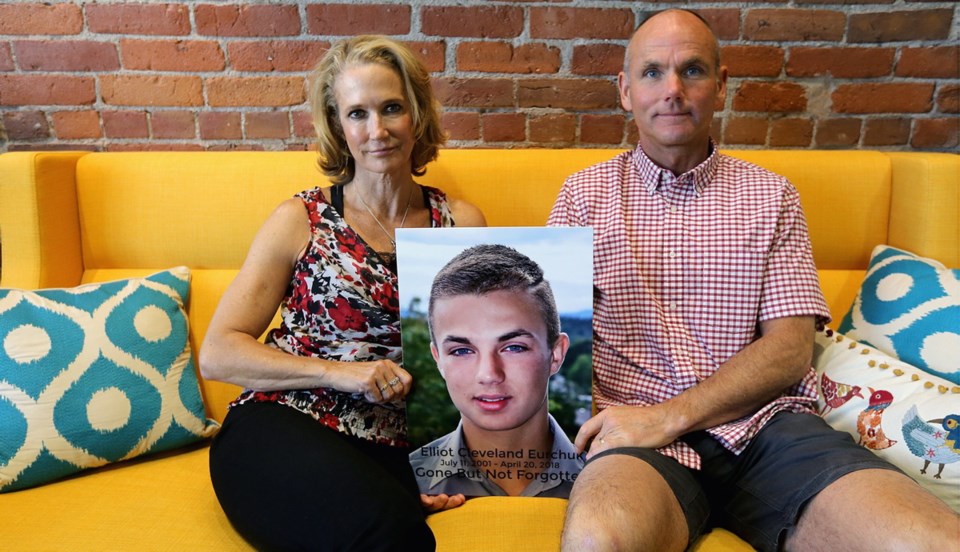Island Health says it can do more under the B.C. Infants Act to improve the flow of information between parents and doctors, following a review of the overdose death of Oak Bay teen Elliot Eurchuk.
Elliot, 16, died of an accidental illicit-opioid overdose in his Oak Bay home on April 20. His parents blame his death in part on opioid overprescribing, the hospital’s use of the Infants Act, which allowed him to dictate his own care and keep his medical records private, and his discharge from hospital without a care plan.
Dr. Richard Crow, Island Health acting vice-president of medicine, quality and academic affairs, said it’s critical that the health authority follow legislation such as the B.C. Infants Act.
However, Crow said, “sometimes there can be various interpretations of what the act might say, so we are wanting to provide more support and education for our care team, including physicians and others, in terms of interpreting how they can share information.”
It’s the first admission that Elliot’s care could have been improved by a less rigid application of the B.C. Infants Act.
“Those are two areas we are looking at making improvements — one in the receiving of information, having families more closely involved,” Crow said.
“And we are also working on improving the understanding and interpretation of our information-sharing arrangements.”
The planned improvements are part of the “action items” that came out of Island Health’s review of Elliot’s care. The health authority also plans to review about 12 pediatric psychiatric patient flow charts and to share a summary of what was learned in the review with all health authorities.
Elliot’s parents, Rachel Staples and Brock Eurchuk, say it’s not enough and a change in legislation is needed.
They have asked the B.C. government to update the Infants Act or adopt the B.C. Liberals’ Secure Care Act, which would allow for the involuntary short-term placement of youth in a facility to address mental-health challenges and substance abuse.
They also want safer prescribing of opioids for youth, and assurances that addicted youth will not be discharged from hospital without an explicit care plan, something Crow said already happens.
Elliot was prescribed a 10-day, 60-tablet course of the opioid Dilaudid after his third surgery for sports-related injuries, and was released just days after overdosing while in hospital for a blood infection.
Crow said several measures to address opioid use and addiction have already been implemented, including a program to enhance education for doctors and other health-care providers on prescribing for pain management and alternatives to opioids.
“Opioids may be needed, but it’s [a question of] for how long and how quickly can you get them off,” Crow said.
A system-wide review of opioid prescribing practices after surgery is underway to ensure appropriate prescribing and tapering of the drugs, he said. Island Health has also established a pilot consultation service.
“For youth in general, we always want to be cautious in terms of our prescribing,” Crow said. “At the same time, you have to balance if an individual is in pain that you give appropriate pain relief because we don’t want the pendulum to swing so far that children or youth live in pain instead of having it addressed.”
Island Health is hiring an addictions specialist focusing on youth for Royal Jubilee Hospital. The specialist will consult with staff on how best to support addicted patients no matter what medical condition brought them to hospital. The program is expected to expand to Victoria General Hospital in the fall.
Crow said significant improvements are underway in addressing child and youth mental health and addictions.
“I’ve been in health care a long time, and we are addressing some really important issues that have been long-standing,” he said.
“There’s a dramatic increase in presentations for children and youth with mental-health and substance-use challenges and admissions to our unit … 30 per cent more presentations in emergency and admissions to our pediatric unit.”
Elliot’s parents say that’s part of the reason a coroner’s inquest into his death is needed.
Staples and Eurchuk have hired a legal team to ask chief coroner Lisa Lapointe to order an inquest into Elliot’s death.
Lapointe wrote to lawyer Michael Scherr on July 6 to say she has been informed “there are a number of issues related to Elliot’s death that would likely benefit from review at inquest.”
“At this time, however, the coroner is awaiting the final results of post mortem testing, as well as other investigative material.”
Once the child death investigator receives that information, she will present Lapointe with her recommendation regarding an inquest, Lapointe said.



